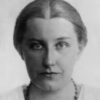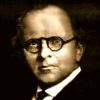A feeling very generally exists that the condition and disposition of the Working Classes is a rather ominous matter at present; that something ought to be said, something ought to be done, in regard to it. […] To us individually this matter appears, and has for many years appeared, to be the most ominous of all practical matters whatever; a matter in regard to which if something be not done, something will do itself one day, and in a fashion that will please nobody.
Thomas Carlyle (1795-1881) Scottish essayist and historian
Chartism, ch. 1 “Condition-of-England Question” (1840)
(Source)
Quotations about:
workers
Note not all quotations have been tagged, so Search may find additional quotes on this topic.
The Mediator between Brain and Hands must be the Heart.
[Der Mittler zwischen Hirn und Händen muss das Herz sein.]
Thea von Harbou (1888-1954) German screenwriter, novelist, film director, actress
Metropolis, ch. 5 [Maria] (1925) [tr. (1927)]
(Source)
The novel was written to be the basis for the film by Von Harbou's husband, Fritz Lang. She also collaborated with him on the script. The movie began shooting before the novel was published.
In talking with the growingly restless workers of the city, Maria adds, shortly after the above line:One will come, who will speak for you -- who will be the mediator between you, the Hands, and the man whose Brain and Will are over you all.
Von Harbau also included an epigraph at the beginning of the novel, which concludes (with a slightly different translation): "The mediator between brain and muscle must be the Heart."
The evangelist was preaching “sin and redemption,” the infinite grace of God and His pardon for human frailty. He was very much in earnest, and he meant well, but Jurgis, as he listened, found his soul filled with hatred. What did he know about sin and suffering — with his smooth, black coat and his neatly starched collar, his body warm, and his belly full, and money in his pocket — and lecturing men who were struggling for their lives, men at the death grapple with the demon powers of hunger and cold! — This, of course, was unfair; but Jurgis felt that these men were out of touch with the life they discussed, that they were unfitted to solve its problems; nay, they themselves were part of the problem — they were part of the order established that was crushing men down and beating them! They were of the triumphant and insolent possessors; they had a hall, and a fire, and food and clothing and money, and so they might preach to hungry men, and the hungry men must be humble and listen! They were trying to save their souls — and who but a fool could fail to see that all that was the matter with their souls was that they had not been able to get a decent existence for their bodies?
Upton Sinclair (1878-1968) American writer, journalist, activist, politician
The Jungle, ch. 23 (1906)
(Source)
Meantime, heedless of all these things, the men upon the floor were going about their work. Neither squeals of hogs nor tears of visitors made any difference to them; one by one they hooked up the hogs, and one by one with a swift stroke they slit their throats. There was a long line of hogs, with squeals and lifeblood ebbing away together; until at last each started again, and vanished with a splash into a huge vat of boiling water.
It was all so very businesslike that one watched it fascinated. It was porkmaking by machinery, porkmaking by applied mathematics. And yet somehow the most matter-of-fact person could not help thinking of the hogs; they were so innocent, they came so very trustingly; and they were so very human in their protests — and so perfectly within their rights! They had done nothing to deserve it; and it was adding insult to injury, as the thing was done here, swinging them up in this cold-blooded, impersonal way, without a pretense of apology, without the homage of a tear. Now and then a visitor wept, to be sure; but this slaughtering machine ran on, visitors or no visitors. It was like some horrible crime committed in a dungeon, all unseen and unheeded, buried out of sight and of memory.
Upton Sinclair (1878-1968) American writer, journalist, activist, politician
The Jungle, ch. 3 (1906)
(Source)
Good government is known from bad government by this infallible test: that under the former the labouring people are well fed and well clothed, and under the latter, they are badly fed and badly clothed.
William Cobbett (1763-1835) English politician, agriculturist, journalist, pamphleteer
Cobbett’s Political Register, Vol. 46 (31 May 1823)
(Source)
“I hope that you did not give him anything, Mr Sanderson!”
“Of course I did, ma’am.”
“But he would only spend it on drink! You know what the working classes are!”
“Indeed, ma’am, and why should he not spend it on drink? Would you deprive the poor, whose lives are bad and miserable and comfortless enough, of the solace of a little relief from grinding poverty? A sordid, sodden relief perhaps, but would you be so heartless as to deny the poor even that pleasure in which all of us indulge at your generous expense?”
You cannot bring about prosperity by discouraging thrift.
You cannot help small men by tearing down big men.
You cannot strengthen the weak by weakening the strong.
You cannot lift the wage earner by pulling down the wage payer.
You cannot help the poor man by destroying the rich.
You cannot keep out of trouble by spending more than your income.
You cannot further the brotherhood of man by inciting class hatred.
You cannot establish security on borrowed money.
You cannot build character and courage by taking away men’s initiative and independence.
You cannot help men permanently by doing for them what they could and should do for themselves.William J. H. Boetcker (1873-1962) German-American religious leader, author, public speaker [William John Henry Boetcker]
“The Industrial Decalogue” (1916)
Often referred to as "The Ten Cannots," and also often misattributed to Abraham Lincoln.
I have no use for those — regardless of their political party — who hold some foolish dream of spinning the clock back to days when unorganized labor was a huddled, almost helpless mass.
The only way in which our people can increase their power over the big corporation that does wrong, the only way in which they can protect the working man in his conditions of work and life, the only way in which the people can prevent children working in industry or secure women an eight-hour day in industry, or secure compensation for men killed or crippled in industry, is by extending, instead of limiting, the powers of government.
Theodore Roosevelt (1858-1919) American politician, statesman, conservationist, writer, US President (1901-1909)
Speech, San Francisco (14 Sep 1912)
(Source)
No; the two kinds of people on earth I mean
Are the people who lift and the people who lean.
Wherever you go, you will find the earth’s masses
Are always divided in just these two classes.Ella Wheeler Wilcox (1850-1919) American author, poet, temperance advocate, spiritualist
Poem (1902), “Which Are You?” st. 6-7, Poems of Power
(Source)
Sometimes titled "Lifting and Leaning".










